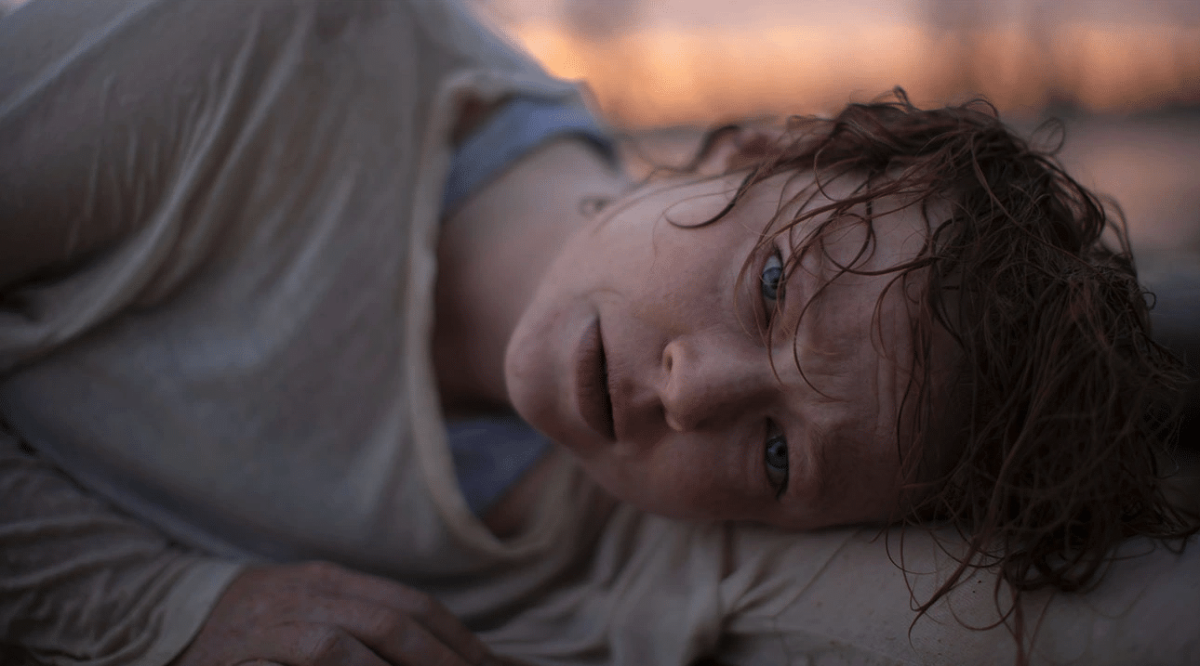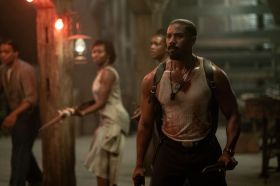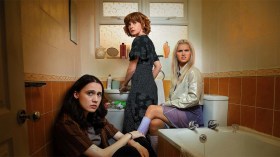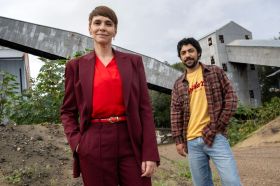Run Rabbit Run is the feature debut of director Daina Reid. Sarah Snook, fresh from Succession, stars as a single mother, Sarah, with a troubled past who starts to believe her child has been possessed by something malicious. On Mia’s seventh birthday, she begins to act peculiar. She adopts a pet rabbit, asks to be called by a name Sarah knows too well, and demands to meet her estranged grandmother. Sarah is still grieving the loss of her father, and her trauma becomes entangled with Mia’s.
The plot follows closely in The Babadook’s footsteps without fully committing to the fairytale-horror that made Jennifer Kent’s film so frightening. One of the few points of levity is in the visual design for the horror: the scary children’s drawings are begging to be psychoanalysed by the daughter from Parasite or uploaded to SCP.
Mia’s creepy mask will hold no surprises for fans of The Orphanage and Goodnight Mommy. There’s potential for thematic depth: a brief scene of Sarah’s work as a gynaecologist implies an Elektra complex, and the ghostly Alice is linked to a white rabbit, but in aiming for subtlety the paranormal seems half-hearted. Sudden noises substitute jump-scares, and often the most chilling moments are played off as delusions.
There are also notes of Relic, Natalie Erika James’ terrifying haunted-house film from 2020. Relic, like Run Rabbit Run, deals with three generations of women drawn together by grandmother’s dementia and trapped in her house as everyone’s sanity frays. Both are superb Australian women’s horror films, and excellent shoulders to stand on: unfortunately, Run Rabbit Run doesn’t do a great deal beyond borrowing from them.
Read: Horror films: are these the scariest ever made?
It leans more toward the Gothic than outright horror. The Australian Gothic is a time-honoured tradition, but like the proliferation of women’s horror cinema, the Gothic needs a radical approach to offer anything fresh to the substantial canon. The moody, meditative shots of the South Australia’s landscape are stunning.
Do be sure to watch in the dark, though: the first half of the film is dimly lit, and the shallow focus obscures much of what can be seen. Some of the film’s most visceral moments are elemental: a furious wind buffets Sarah and Mia’s beachy home in every shot, but as they venture out to grandmother’s house, an equally haunting stillness settles over the landscape.
Read: Run Rabbit Run and Late Night With the Devil: meet the directors
Australiana can really get under your skin, haunting the houses that haunt you, but the interludes of vast, static landscapes become sleepy as the film drags on. Despite the breadth of space, Sarah and her family tread familiar paths: the rich and storied ecosystem that makes the film visually unique serves as little more than a matte painting to play out the family drama.
In ways, it’s a fitting backdrop for the violent history always implicit for a white nuclear family living on Ngawait land—but it’s never more than a backdrop. The violence in this family has an unexpected source: these drawn-out establishing shots will give you plenty of time to figure out the twists.
Read: Cheat sheet: Run Rabbit Run
It’s a blessing to be riding a wave of homegrown horror from emerging women filmmakers. Run Rabbit Run would have been a spectacular milestone in the growing canon ten years ago. As it is, there’s a host of recent examples that manage both visceral terror and nuanced feminist themes.
Snook gives a strong performance, and newcomer Lily LaTorre manages a difficult role very well, while Greta Scacchi is sadly under-utilised. All the elements of an excellent genre piece are here, but Reid’s austere direction never strives for the high bar set by her predecessors.
The result is slightly less haunting than that ad for the Barossa Valley where they imply they’re going to cannibalise you.
Run Rabbit Run is streaming on Netflix.
Actors:
Director:
Format:
Country:
Release:





